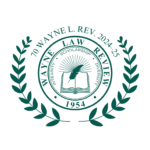Uses of the Class Action Device in Autism Health Benefits Litigation
In the past twenty years, a striking rise in the diagnosis of autism has helped generate increasing levels of attention to the disorder within legislatures and courts throughout the United States. A significant subset of both the legislative and judicial interaction with autism involves whether, and how, treatment for the disorder should be covered by health insurance providers. This Note analyzes a collection of recent class action lawsuits in which parents of autistic children challenged insurers’ denial of benefits for Applied Behavioral Analysis (ABA) therapy, perhaps the most widely accepted treatment for autism. The Note specifically examines the strategic advantages and drawbacks of choosing to litigate a denial of benefits for autism therapy as a class action rather than as an individual lawsuit. Read More …
